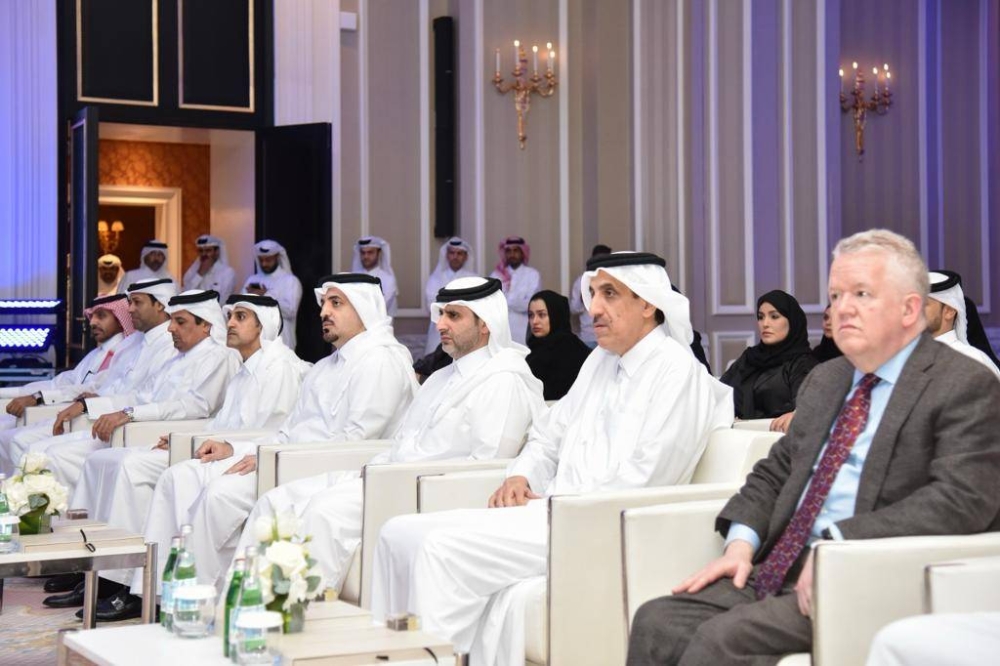HE the Governor of Qatar Central Bank (QCB) and Chairman of the Board of Directors of Qatar Financial Markets Authority (QFMA) Sheikh Bandar bin Mohamed bin Saoud al-Thani launched on Thursday the 2023-2027 QFMA 3rd Strategic Plan, in the presence of a number of members of the QFMA's Board of Directors and CEO of QFMA Dr Tamy bin Ahmad al-Binali, as well as the QFMA's leaders and department directors.
Al-Binali said that QFMA's new strategic plan is based on the Qatar National Vision 2030 and the 3rd Qatar National Development Strategy (QNDS), with strategic domains: Fiscal Stability and Sustainability, Financial System Stability and Economic Resilience, in addition to the 3rd Qatar Financial Sector Strategy (FSS), with strategic dimensions: Governance and Regulatory Oversight, Islamic Finance, Digital Innovation and Advanced Technology, Institutional Governance for Environmental and Social and Governance (ESG) and Talents and Competencies.
Al-Binali added that the new QFMA strategic plan also has considered QFMA LAW, Vision, and Mission; Qatar Economic Outlook inclusive of GCC; Benchmarking Study of Capital Market Regulators Strategic Plans, Review of Global Capital Market Regulators, Review of Qatar CM Sector & EAP for Capital Development Projects, Review of QCB FinTech Strategy, and the IOSCO Principles and FATF 2023 Qatar Observations.
By adopting the 3rd FSS, QFMA is working to achieve the desired transformation in the Qatari capital market sector, as the future vision related to the capital market within the plan aims to achieve an enhanced regulatory framework aligned with international standards, including robust regulation on investor protection, market transparency, and corporate governance, and the achievement of a state-of-the-art capital markets infrastructure, including electronic trading platforms and cloud computing facilities, ensuring data accessibility, and moving the market from emerging to developed market status.
Al-Binali pointed out that the vision of the QFMA in accordance with the new strategy is to advance the Qatari capital market to the "Developed" status, which represents one of the main pillars of the national economy, explaining that the QFMA's mission according to the strategy also includes the development and regulation of financial markets to ensure the protection of their participants, based on high-level legislative standards and sustainability practices by strengthening the technological infrastructure and human capital with diverse competencies, and raising the awareness of market participants.
Al-Binali spoke about the details of these objectives in terms of initiatives related to each of them, where he explained that the first strategic objective includes initiatives to determine the legal and regulatory changes in the State (QFMA law, QCB law etc ) to support enhancement of capital market, implementing Governance Codes for Financial Services Companies, Companies Listed on the Main Market and Second market, Listed Funds and Entities subject to the Authority's supervision, developing a Framework for Fixed-Income Markets and for Asset Management as well for Islamic Finance related to Capital Market, developing targeted regulations for Green Assets and initiative for developing Solvency Standards.
The first objective 'sinitiatives also include updating AML/CFT rules related to account opening and VA & VASPs and emerging risks, setting and issuing regulations for the private companies' market, updating the codes of external auditors and financial evaluators of listed entities and audited entities, enhancing the code of conduct for employees in the trading sector (licensees and listed companies' employees), developing standards for financial evaluation, research and dissemination of information related to the market and securities 2022, developing legal/regulatory framework for digital assets and smart contracts.
The second strategic objective includes initiatives to rebrand the corporate identity of the QFMA to reflect on the strategy and sustainable markets, develop an environmental-friendly new headquarters for QFMA, enhance the Risk-Based Supervision Model, establish a Risk Insurance Fund in accordance with Article 53 of Law No (8) of 2012 regarding the QFMA.
Al-Binali said that the initiatives of the third strategic objective are to develop and execute the Digital Transformation Strategy, adopt the QFC Model in the digital/virtual marketplace (3rd FSS) and consider future implementation, considering Robotic Advisory for Asset Management, and support the creation and innovation of the private companies' market.
With regard to the fourth strategic objective, he explained that the initiatives of this objective include spreading financial awareness and culture of organising international specialised seminars for investors and dealers in the financial markets and those interested, introducing research papers, introducing the basics of investment and investor protection to school and university students at international financial events, developing programmes on the importance of investment in the bond market, enhancing knowledge in Islamic Finance, Asset Management and ESG, introducing the concepts of Digital/Virtual products and services, and increasing Financial Inclusion Initiatives.
The initiatives of the fifth strategic objective include establishing strategic co-operation with local regulators and other local government entities, activating channels of collaboration through memorandums of understanding and co-operation with regional and international organisations, increasing co-ordination and co-operation with counterparts in the GCC countries, raising the level of participation and hosting of conferences and meetings, starting the process of becoming a signatory to the IOSCO EMMoU, entering into MoUs and co-operation agreements with well-established international fintech and asset management hubs, and creating an international resources and research library.
Al-Binali continued by saying that the initiatives of the sixth strategic objective include supporting and investing in the Qatarisation Plan (Recruitment and Talent Acquisition) and maintaining an acceptable turnover ratio, developing the digital accelerators' programmes for locals, adopting and executing specialized programmes for leadership development, and developing and enhancing the performance management framework and the remuneration structure of QFMA.

HE the Governor of Qatar Central Bank (QCB) and Chairman of the Board of Directors of Qatar Financial Markets Authority (QFMA) Sheikh Bandar bin Mohamed bin Saoud al-Thani launched on Thursday the 2023-2027 QFMA 3rd Strategic Plan, in the presence of a number of members of the QFMA's Board of Directors and CEO of QFMA Dr Tamy bin Ahmad al-Binali, as well as the QFMA's leaders and department directors.
